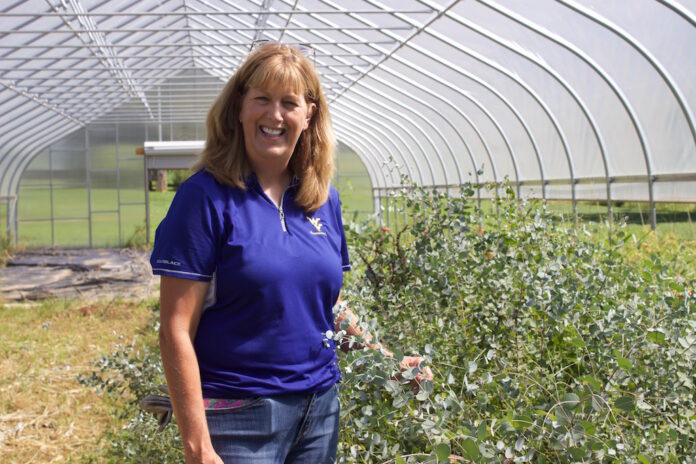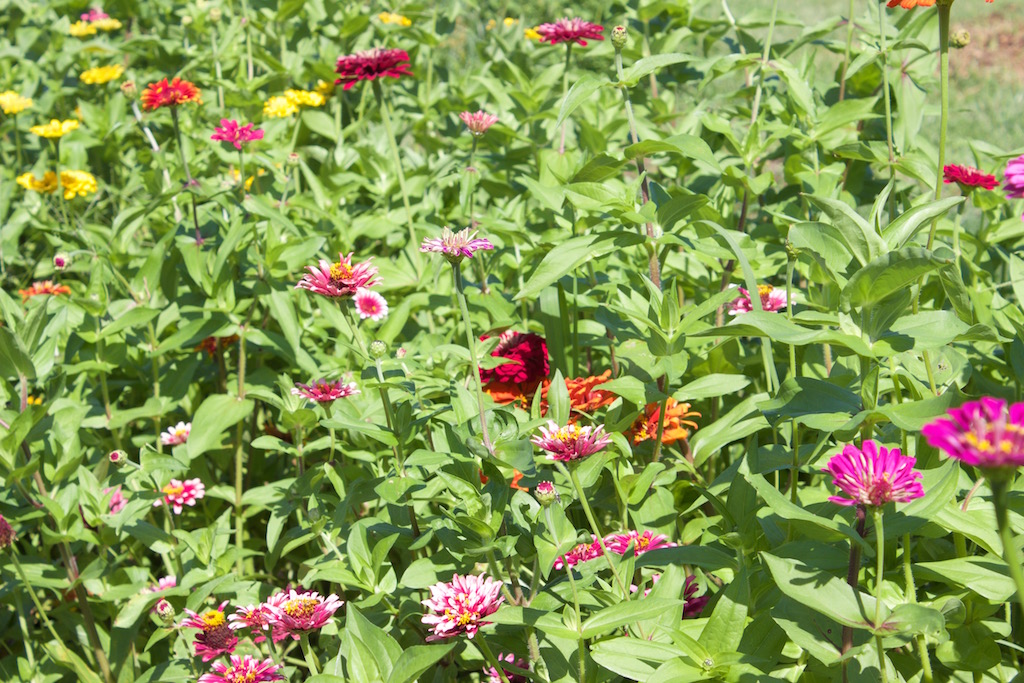
LEROY, W.Va. — When Violet Maston, of Sweet Violet Farm, first told her husband, Clyde, she wanted to start growing and selling flowers, he was surprised. She never had the best luck with potted plants. But growing in the ground was different.
“He said ‘Are you sure that’s what you want to do? You kill everything,’” she explained. “If it’s in the pot, I’ll kill it. But if it’s in the ground, God blesses it, and He grows it. And that’s pretty much the way that’s the way I feel about it.”
Her interest in flowers started about 12 years ago. She was going through a difficult time, and used to get discount flowers at Krogers to keep on her table. A few years later, she got the idea to try growing and selling her own. Now, she grows more than 50 varieties of flowers at her farm, in Leroy, West Virginia, selling them to local florists and directly to customers.
“I always felt like those flowers gave me so much peace and so much comfort,” Violet said. “I guess it doesn’t feed people, but you know, food fuels the body and flowers feed the soul.”
Family farming
Maston spent much of her childhood on her family’s farm, in Leroy, West Virginia. Her family ran a cow-calf operation and grew corn silage there, after previously running a dairy farm in Upshur County. Maston raised and sold sheep as an FFA project through high school. After college, she worked as a teacher for 25 years, until she retired.
After retirement, in 2014, she and Clyde bought a goat dairy near the family farm. They ran that for a few years, “worked ourselves to death; didn’t make a dime,” Violet said. In the meantime, Violet’s father passed away and left the family farm to her and her sisters.
About four years ago, they decided to give up the dairy, and Violet started growing flowers on the family farm property. For a while, they went back and forth between their home and the farm, using their home’s basement as a greenhouse and planting older seedlings in the ground at the farm. Then, in 2021, they sold their other property and fully moved back to the family farm.

Flowers
In the first few years at the family farm, she and Clyde have done a lot of work on infrastructure. They added a high tunnel, a greenhouse, fencing to keep deer out of the gardens and an irrigation system that catches water from a barn roof and uses it to water the flowers in the gardens and high tunnel. Clyde, a retired engineer, built the irrigation systems and has helped with other infrastructure on the farm.
This year, Violet was honored as one of the West Virginia Women in Agriculture Award winners by the West Virginia Department of Agriculture. She was nominated by a customer who often drove past the farm and saw Violet working in her gardens.
“I feel very undeserving … I guess I don’t feel like what I do is award-worthy,” she said. “But it’s very humbling to think that somebody would look at this, because I’ve experienced so much of people not recognizing this as agriculture.”
But it is labor-intensive, with a lot of hands-on planting, weeding and harvesting. She uses succession planting, so that she has flowers in bloom for longer rather than planting all at once and running out halfway through the season, so she’s often in a cycle of planting, growing, picking and delivering flowers.
“She has a routine,” Clyde said. “She’s at it from about 10 o’clock in the morning until, sometimes, she’s out here at seven, eight o’clock at night.”
Violet compares being a flower farmer to being a mother. When the flowers start out as germinated seeds and then seedlings, they need a lot of attention, and just the right amount of moisture, heat and light to get them off to a good start.
They grow up a little bit and can move into the greenhouse, in what she considers the toddler phase. They still need attention and protection, but aren’t quite as delicate. Finally, they finish maturing in the garden, where they gradually begin to face and overcome more challenges with things like weeds.
“Then they graduate, and their job is to go out and make the world a happier place,” Violet said.

Marketing
She sells many of her flowers to florists, locally, and further away. Her flowers go to weddings, funerals, birthday parties, proms and more.
For the first year or two, she mostly sold to florists in Jackson County. Clyde encouraged her to try bringing her flowers down to Charleston, so eventually, she made a trip down to introduce herself to florists in Charleston and see if they were interested in her flowers. They were, and before long, several of them became customers, too.
It was a little surprising to Violet, since she knows many florists already have wholesalers they work with. A lot of flowers sold in the U.S. are imported from South America. But she is able to provide fresher flowers, and some more local varieties that aren’t as widely available through wholesalers.
“You can’t compete with the prices, but you can compete with the quality,” she said. “I’ve just been so blessed with some really amazing florists to work with.”
Having those connections also helps her plan for each growing season. The florists are able to tell her what flowers they would be interested in buying, and what they already have suppliers for, so she can get a better idea of what and how much to plant.
She also opens the farm for people to come and make their own bouquets on Saturdays. On the farm, she often gets people visiting from cities like Marietta, Ohio, and Parkersburg, West Virginia. Advertising her flowers on social media has helped her get the word out about the farm to people from further away.
Improvements
She is continuing to make improvements on the farm, trying new varieties and new management practices. Visiting flower farms is partly about the experience, she said — people like to be able to walk and take photos in the gardens. That means weeds are a major issue from an agritourism standpoint, as well as from a growing standpoint.
In 2022, the weed pressure was particularly bad, partly because of the rainy conditions. Next year, she is planning to try soil steaming, which involves heating up water to produce steam that kills seeds in the soil to keep weeds down. She and Clyde will be driving to South Dakota to pick up a soil steamer soon.
“Hopefully, it will be a game changer,” she said.









